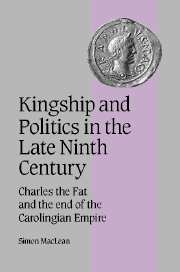 Kingship and Politics in the Late Ninth Century
Kingship and Politics in the Late Ninth Century Book contents
- Frontmatter
- Contents
- List of maps and figures
- Acknowledgements
- List of abbreviations
- Note on names, terminology and citations
- Outline chronology
- Figure 1 The Carolingian family
- Map 1 The late Carolingian empire
- 1 INTRODUCTION
- 2 UN-FRANKISH ACTIVITIES: CHARLES THE FAT IN THE EYES OF CONTEMPORARY ANNALISTS
- 3 THE MEN WHO WOULD BE KINGS: THE ‘SUPERMAGNATES’ AND THE ‘RISE OF THE ARISTOCRACY’
- 4 ROYAL POLITICS AND REGIONAL POWER IN THE LATE CAROLINGIAN EMPIRE
- 5 THE END OF THE EMPIRE I: POLITICS AND IDEOLOGY AT THE EAST FRANKISH COURT
- 6 THE END OF THE EMPIRE II: RESPONSE AND FAILURE
- 7 HISTORY, POLITICS AND THE END OF THE EMPIRE IN NOTKER'S DEEDS OF CHARLEMAGNE
- 8 CONCLUSION
- Bibliography
- Index
- Cambridge Studies in Medieval Life and Thought Fourth Series
1 - INTRODUCTION
Published online by Cambridge University Press: 15 July 2009
- Frontmatter
- Contents
- List of maps and figures
- Acknowledgements
- List of abbreviations
- Note on names, terminology and citations
- Outline chronology
- Figure 1 The Carolingian family
- Map 1 The late Carolingian empire
- 1 INTRODUCTION
- 2 UN-FRANKISH ACTIVITIES: CHARLES THE FAT IN THE EYES OF CONTEMPORARY ANNALISTS
- 3 THE MEN WHO WOULD BE KINGS: THE ‘SUPERMAGNATES’ AND THE ‘RISE OF THE ARISTOCRACY’
- 4 ROYAL POLITICS AND REGIONAL POWER IN THE LATE CAROLINGIAN EMPIRE
- 5 THE END OF THE EMPIRE I: POLITICS AND IDEOLOGY AT THE EAST FRANKISH COURT
- 6 THE END OF THE EMPIRE II: RESPONSE AND FAILURE
- 7 HISTORY, POLITICS AND THE END OF THE EMPIRE IN NOTKER'S DEEDS OF CHARLEMAGNE
- 8 CONCLUSION
- Bibliography
- Index
- Cambridge Studies in Medieval Life and Thought Fourth Series
Summary
THE END OF THE CAROLINGIAN EMPIRE IN MODERN HISTORIOGRAPHY
The dregs of the Carlovingian race no longer exhibited any symptoms of virtue or power, and the ridiculous epithets of the Bald, the Stammerer, the Fat, and the Simple, distinguished the tame and uniform features of a crowd of kings alike deserving of oblivion. By the failure of the collateral branches, the whole inheritance devolved to Charles the Fat, the last emperor of his family: his insanity authorised the desertion of Germany, Italy, and France … The governors, the bishops and the lords usurped the fragments of the falling empire.
This was how, in the late eighteenth century, the great Enlightenment historian Edward Gibbon passed verdict on the end of the Carolingian empire almost exactly 900 years earlier. To twenty-first-century eyes, the terms of this assessment may seem jarring. Gibbon's emphasis on the importance of virtue and his ideas about who or what was a deserving subject of historical study very much reflect the values of his age, the expectations of his audience and the intentions of his work. However, if the timbre of his analysis now feels dated, its constituent elements have nonetheless survived into modern historiography.
- Type
- Chapter
- Information
- Kingship and Politics in the Late Ninth CenturyCharles the Fat and the End of the Carolingian Empire, pp. 1 - 22Publisher: Cambridge University PressPrint publication year: 2003
